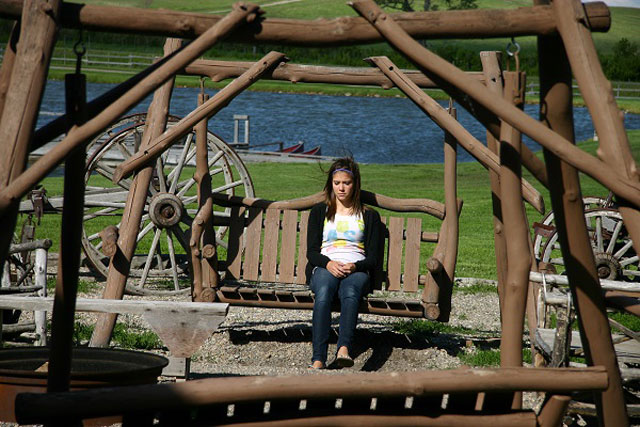DLTK's Crafts for Kids
Parenting Thoughts: Introverts and Extroverts
I’m an introvert. My daughter, Tasha, is an extrovert. Darren and Kaitlyn are more “in the middle”—a little on the introverted side, but less so than me.
I’m going to start off by clearing up one giant misconception: introverts aren’t all shy and extroverts aren’t all friendly. I’m an introvert AND I love people, I have fun at parties and I find it easy to talk to strangers. In fact, I’m by far the most outgoing member of the family when dealing with people outside of our ordinary social circle. It’s just tiring. So is hiking and I like that too.

So what does it mean to be an introvert or extrovert?
Here’s a simple analogy: Imagine you have an emotional battery that needs to be charged in order to be a happy and content human. Introverts charge their batteries when they are alone and they drain their batteries when they are with other people. Extroverts do the opposite—their batteries are charged when they’re socializing and are drained when they’re alone.

Like all human traits, this is a scale—people aren’t just 100% introverted or 100% extroverted… a lucky few are so 50/50 that their emotional batteries always remain pretty much topped up. Some people drain their batteries slowly or charge their batteries quickly. And, of course, lack of sleep or a no–good, horrible, very bad day can suck the juice right out of anybody’s battery in no time flat.
I know for myself that my battery drains pretty quickly (I have about a 2 hour battery life, hehe) but, oddly, if Darren (my husband) is in the room it drains much slower and if he’s at my side paying attention to me he actually has the power to charge it up a bit! He on the other hand, has a gigantic, slow draining battery—but heaven help us all if he lets that thing run down, heh.

Parenting the Opposite Personality:
While this is all very interesting, it isn’t just random information—awareness of these differences is actually an incredibly helpful parenting tool—especially if your child charges his or her emotional battery a little differently than you do. Our oldest daughter, Tasha, is an extrovert—she has a big group of friends that she loves to socialize with. For her, time spent alone is emotionally draining. Something I still have to make a conscious effort to be mindful of.
Early on while parenting Tasha, I would give her alone time when she was having a rough or tiring day. Because that’s what I need when I’m feeling drained, sad or grumpy, I mistakenly believed that’s what she needed too. After many years of struggle I finally realized that she’s my daughter not my clone (duh)—Tasha actually needs to hang out with friends when she’s feeling emotionally exhausted (unlike me who needs a good book and a bubble bath). Who knew!?

Some Tips for Parenting an Introvert:
- Do not assume that their need for alone time is the equivalent of being “anti–social”. Instead watch them when they have a full battery and are with people—do they interact well? If so, then just let them be alone when they need it—they’re simply charging their batteries up. Don’t worry when the social situation is over and they slump a little and say, “wow, that was exhausting”. They’re just giving you honest feedback which is a GOOD THING! Respond with something like, “Well, you did great—is there anything you’d like to do now to relax a bit?” And if their answer is, “I’d like to play my video game” please don’t sigh and roll your eyes at them! I love playing video games (Hay Day is my favorite right now)—it’s one of the quickest ways for me to recharge and get ready for the next social situation.
- Don’t judge your kids too harshly when you know their batteries are run down and they’re forced into situations they find challenging—they likely won’t shine. For an introvert, challenging situations often include socializing with groups—things like soccer practice!
- Give your kids opportunities to charge up with alone–time activities right before events that matter to you or to them.

- Respect your child’s desire to pick his or her own alone–time activities. Alone time is NOT necessarily housecleaning and homework—it could be a good book, strumming away on a guitar or, yes, even a video game! For Darren, it’s doing income taxes *grin*. But that’s the point—all introverts don’t charge in exactly the same way.
- Help them learn to “unplug”—this can be scary as feeling our battery drain is a “real” feeling. It can require support, encouragement and practice for some children to get used.Have you ever been the one with the laptop who always keeps it plugged into the wall? (I admit it, I have.) It can be such a pain to be aware of the battery level and find a place to charge it when it runs down that it’s tempting to just keep the darn thing plugged in all the time. Introverts, myself included, sometimes feel the same way—if I just stay alone reading books or making websites I never have to worry about my battery—I never have to awkwardly excuse myself from a party that just doesn’t seem to want to end. I never have to deal with that feeling of my emotional energy draining nor do I ever have to risk being drained to the point that I lose the ability to cope.
But what happens to that laptop that you always leave plugged in? When you eventually decide, “Oh! Today I really need the battery.”—the battery sucks. It runs out of juice quickly if it will even hold a charge at all. That’s why I love the battery analogy. It reminds me that I have to keep using my emotional battery, letting it drain and recharge, so that I get familiar with what that feels like and so that I know I have a fully functioning battery when I need one.As a parent, it’s important to help your children to learn to unplug by talking about the experience and letting them know that it’s a normal feeling. At first keep it all nice and short so the kids realize:
“Yep, that drained my battery and, although I felt it happening it wasn’t a bad thing. Now I’m back at my charging station (my books, my games, my bathtub) and maybe it wouldn’t be so bad to try that again tomorrow.”
Short, controlled practice also gives you the chance to encourage open communication with them—“Look honey, I know this is happening to you and it’s perfectly normal. Everyone just has a bit of a different experience so YOU need to tell me when you’ve had enough.” - For an introvert, solo and small group activities like music, art, tennis or golf might be more comfortable than team activities like soccer or football. Just remember that we do have to encourage them to unplug (see #5) so I don’t mean they should never participate on a team. It just means that you should be aware that team activities are draining for them—let them have a bit of quiet time before and after instead of dashing from one draining activity to another.

Some Tips for Parenting an Extrovert:
Most of the tips are the same, just the other side of the coin!
- Don’t assume that when they’re feeling blue that they need a nap or quiet time. For extroverts, it’s time with others that charges them up.
- Don’t judge your kids too harshly when you know their batteries are run down and they’re forced into situations they find challenging—they likely won’t shine. For an extrovert, challenging situations often include being alone—things like homework! On a personal note, once I realized all of this it became apparent that Tasha (extrovert) actually does homework and studies better in a group. This took me a while to wrap my head around because it’s so foreign to me (introvert). Once I accepted this, her marks improved.
- Give your kids opportunities to charge–up with social activities right before alone–time events that matter to you. So if you’re expecting them to stay “home alone” one evening while you are out on an anniversary date, make sure they’ve had a nice social day beforehand. (If you have employees who are extroverts, don’t lock them up in a room preparing presentations right before an important client event—let them have social time with the team or they’ll use up all their steam preparing presentations and do an awful job with the client).

- Respect their desire to pick their own social activities. Some people charge up from being lost in a sea of strangers—shopping mall!
Some like to meet new people while others like team activities (sports). Some like to be with a large group of acquaintances while others like to hang out with a couple good friends. - Help them learn to “unplug”. Just like introverts, extroverts will often tend to always want to do the thing that keeps them charged up. I think “normal society” tends to force extroverts outside of their comfort zone less than it does to introverts but it’s still important to make sure extroverts practice being alone.
- Don’t make time alone seem like nothing but a punishment!! Extroverts need to learn how to manage alone–time just like introverts need to learn to manage social situations. If you set it up so alone time is always a negative thing, it will be harder for the extroverts in your life to learn to approach alone–time with a positive attitude.When Tasha was young, time outs worked really well as a punishment for her (extrovert). One time she said, “It isn’t fair, Kaitlyn LIKES time–outs.” Another time she said to me, “I should give YOU a time out”. Darren started to chuckle, “your mom loves time outs.” And it’s true—I give them to myself all the time, I just call them “breathers”. And we realized—holy smokes, we have one introvert and one extrovert—time outs actually are a battery charger for Kaitlyn and a battery drainer for Tasha—not only that, but time–outs were battery chargers for Darren and myself too—so the only one being drained was poor Tasha.
After that, we modified the “time out punishment” to be used as a tool alongside “conversation punishment” where we sat as a family and discussed the issues—depending on the situation sometimes we’d use time–out and sometimes we’d use conversation. We also worked hard on making the idea of “spending time alone” a skill Tasha should embrace not a punishment she should dread.

All photos in this blog post are copyright Leanne Guenther or Darren Guenther.
 About Leanne:
About Leanne:
Wife, mom and the woman behind the scenes of the DLTK's Crafts for Kids websites. The websites are a terrific hobby -- run by (me) Leanne, a mom with two girls as my official craft testers and my husband as my technical support. DLTK are the first initials of each of the people in my family (I'm the L!). Whenever we send out little cards or whatnot, we sign 'love DLTK' ... when I started the website I used the initials. Had I known the website would get actual strangers visiting it, I would have picked a less mysterious name but we're all stuck with it now!
You can view my other blog posts here.